- Home
- J. M. Hayes
Plains Crazy Page 10
Plains Crazy Read online
Page 10
“I’ve heard worse.” She smiled and offered her hand. “I’m Jane, Jane Jorgenson, Dr. Jones. Mad Dog tells me you’re the best doctor in the state. I get the impression second best wouldn’t be good enough for Hailey.”
Doc smiled, straightening his perpetual scowl. “Pleased to meet you, Ms. Jorgenson. I shouldn’t be surprised by this visit. Mad Dog has kindly let me tend to Hailey a time or two before, though he doesn’t trust me to diagnose his own ills.”
“I don’t have any,” Mad Dog said. He gestured toward Hailey’s blood-soaked coat. “Can’t you please…”
Doc knelt and examined Hailey’s matted fur. He was gentle and she trusted him enough to put up with it. “What’s happened to you?” he crooned, putting on the bedside manner he assumed for children, wolves, and similarly dangerous creatures.
“An arrow, I think,” Mad Dog explained.
“Arrow?” Doc’s brows furrowed and the scowl came back full force. “That’s odd.”
“Not really,” Mad Dog explained. “That kid you’ve got down the hall. I think maybe I was the one that arrow was supposed to hit. At least, somebody had a couple of shots at me when I was over at the courthouse a few minutes ago. Hailey didn’t take kindly to it. She chased him, got her teeth in his pant leg, I think. I’m guessing he shot her as well.”
Doc was thorough. “There’s a slash through one ear,” he said. “It’s a clean wound and it doesn’t look like she’s hurt anywhere else. Ears, they bleed a lot.”
“Can you help her, Doc?” Mad Dog pleaded.
“I don’t think so,” Doc replied. Mad Dog blanched and Doc hurried to explain. “This looks worse than it is. I can knock her out and stitch it up, but we’d probably have to stick her in one of those cone collars to keep her from scratching the stitches right out. I don’t think you want to put her through that, Mad Dog. She’s nearly quit bleeding already and she’s leaving it alone. We’ll just apply a little antiseptic and let her get on with life with a notch in her ear. It’ll bother you more than it does her. And it’ll bother both of you less than turning her into a conehead for a couple of weeks. Those things are bad enough for dogs. Impossible for wolves, I expect.”
“Right,” Mad Dog agreed. “I can’t see putting her in one of those things, but what about the blood she’s lost?”
“She’s got plenty left,” Doc reassured him. “Just make sure she gets to drink all the water she wants, and maybe feed her a little extra protein the next few days. She’ll be fine, long as you keep yourselves away from this mad archer. Why on earth would someone want to shoot you, Mad Dog?”
“I can’t think of a single reason.”
Janie cleared her throat. “Well I sure can,” she told them.
***
“This is a waste of time,” Supervisor Haines said. Deputy Wynn was inclined to agree. They had canvassed all the houses behind the courthouse and north of Main. All they’d found were a few people who’d heard a motorcycle leaving the area in a hurry. None of them had seen it. A couple had seen Mad Dog cutting through the neighborhood. One had seen Deputy Parker.
“We should be over at the Farmers & Merchants, where the action is,” Finfrock said. Wynn Some agreed again, but his daddy didn’t.
“No such thing,” the chairman protested. “This had to be done and there aren’t enough deputies for an emergency like this. Those of us without law enforcement skills, we’ve got to lend a hand now and then.”
“Hey, I got law enforcement skills,” Wynn Some complained.
His father glanced at him and continued. “Like I said. Besides, what could we do at the bank? I’m sure Deputy Parker has things under control. We’d just be in her way. Anyway, that’s over. What we gotta do now is figure out how to stop this terrorist’s next attack.”
“Wouldn’t hurt to go to the bank, though,” Finfrock said. They had finished knocking on doors and were at the corner of Main and Van Buren, only about four blocks from the crime scene. “Folks like to know their supervisors care what’s happened to them and their money.”
“I’m with Finfrock,” Haines said, “only let’s take a minute and walk down to the Texaco. A motorcycle runs on gas. Maybe the guy stopped to fill up before he started turning the back of the courthouse into a pin cushion.”
“Makes sense,” the chairman said.
“And we could get us a soda,” Wynn Some agreed, suddenly enthusiastic again. All that door to door effort had worked up a thirst.
The Texaco and the Buffalo Burger Drive In dominated the corner at Harrison and Main. The intersection was Buffalo Springs’ busiest, since both streets were part of the Kansas State Highway system. Unlike other streets in town, these continued well beyond the municipal boundaries, and stayed paved. Both blacktops stretched straight and flat toward the edge of the world, or so it seemed from where a four-way stop and blinking red lights marked it.
The Texaco was the only place within twenty miles that was open twenty-four/seven. With people coming to town early because of Buffalo Springs Day, there were a couple of cars drawn up at the pumps and several more in the parking lot. A mechanic was finishing an oil change in the attached garage—all that remained after a shiny new food mart and self-serve gas pumps had replaced the original station.
“I’m thinking I want a root beer,” Deputy Wynn told the supervisors.
“Iced tea would be good,” Finfrock said.
They threaded their way around the cars by the pumps, exchanged greetings with the customers, and made their way toward the entrance. Wynn Some had his hand on the door when Haines’ voice stopped them all in their tracks.
“Holy shit,” he said. “Here’s another one.”
Wynn Some knew what he meant.
“Where?” his daddy asked.
“Right here, leaning against this pump.” The pump in question was attached by a hose to a Ford F-250. The pump’s digital display was flashing an ever increasing dollar and gallon total. A bomb and gas vapors didn’t sound like a good combination to Deputy Wynn. He knew what he had to do.
“Run for your lives,” he shouted, pushing through the door to the food mart and the cashier’s counter. The customers all turned and looked at him, but nobody ran—he was blocking the exit. Back out toward the bomb and pumps wasn’t where the deputy had intended to go, but he needed to move. He turned and considered his choices. He didn’t get time. Jud Haines bent and picked the thing up.
“Don’t touch it,” the deputy’s father shouted, too late.
Haines took two steps toward the intersection. Like an outfielder trying to pick off a batter with plans to stretch a single into extra bases, he put everything into his throw. The lot across the highway was empty but for high weeds and a drainage ditch that fed into nearby Calf Creek. Wynn Some didn’t hear the splash when the bomb landed, but he did see the geyser of mud and grass and water that erupted the moment it exploded. Little chunks of slime and mulch plastered the window of the Texaco.
“Jesus,” Finfrock said, grabbing hold of a customer as if he would have otherwise been forced to sit right down on the concrete. “If you hadn’t grabbed that just then…”
“There wouldn’t be a Texaco anymore,” Wynn’s daddy continued. “And we’d all be dead.”
It was a concept that penetrated even Wynn Some’s imagination. He stumbled out of the Texaco’s doorway and left his breakfast in the nearest waste bin.
***
Deputy Parker could tell the Heathers were getting a kick out of this. Adults who, all their lives, had treated them like little kids—ignored them or done pat-on-the-head, isn’t-she-cute stuff—were suddenly listening to and obeying them. They were Englishman’s daughters. Somebody had to take charge. Parker was the power behind their thrones, but she’d been interviewing witnesses, none of whom had proved of much value yet. That left the Heathers to handle crowd control.
“What a kick,” she heard one Heather tell the other. “I just sent our old chemistry teacher home and told him it was because he
didn’t know anything.”
So far, only two people had actually seen the bomber: the teller, who was convinced it had been Osama bin Laden in drag, and the farmer who’d driven by just minutes before the blast.
“I sure didn’t see no Osama,” he said. The figure he’d seen was some hot young babe decked out in come-fuck-me clothes, though that wasn’t how he phrased it. “Tight-ass jeans and a clingy tee shirt,” he said. He hadn’t recognized her, but she’d known him well enough to shout an insult that named his wife. Or so he claimed.
“Anybody left?” Deputy Parker asked a Heather. The deputy was through with the farmer whose recollection was of an under-dressed Jezebel instead of a cross-dressed zealot.
“Just Millie. She runs the beauty parlor down the block. She didn’t see the bank robber, but she says Mom was in this morning and planning to go to the bank. Millie thinks Mom might have seen something, since she left the beauty shop just before the blast.”
Parker shook her head. “Doesn’t seem likely, does it? If your mother were a witness, she’d have stuck around, or been in touch with your father right away. Still, I suppose I better talk to this Millie person. Where is she?”
Heather English looked around. Thanks to the girls’ efficiency, there was no longer a crowd concealing Millie. “There she is,” Heather said, pointing across the street at the beauty parlor.
Millie was standing, looking at her place of business from just beyond the curb. Her body language indicated she was seeing it in a different light than before. She looked cowed, overwhelmed, as if she’d suddenly realized this ugly converted barbershop was not the key to the beachfront retirement which she’d planned.
“Excuse me,” Heather called. “Deputy Parker is ready for you now.” Millie took a couple of steps toward them, but she was backing up, paying no attention to Heather’s summons.
Parker considered calling out herself, but she was reluctant to address the woman by her first name and she didn’t know Millie’s last. The sign over the front door just said MILLIE’S PAVILION OF BEAUTY. Under that, the pale outline of one of the barbershop’s former offerings could be made out through the fading paint—FLATTOPS, OUR SPECIALTY.
“Uhh, Millie, the deputy wants you.”
Millie finally turned. There was such a look of horror in her eyes that Parker immediately put her hand on the butt of her weapon and half crouched.
“Help,” Millie squeaked. “There’s another one, right in my front door.”
Heather took a step into the street, angling for a better look. That was where she ran into Parker’s arm.
“Get back,” Parker said, voice strained. “Get everyone off the street and under cover. Do it now.”
There really wasn’t anyone other than the Heathers in need of doing what Parker asked. The people from the Farmers & Merchants hid behind cars and buildings. The other business owners from the neighborhood were similarly hunkered down.
“Come on,” the other Heather urged. The sheriff’s daughter let her sister drag her behind the black and white. Parker shifted her attention to Millie’s entry. Something stood on the concrete next to a screen door that kept out flies, but not this morning’s glorious spring breeze.
Parker edged to Millie’s side. Millie was pointing. “You see it?”
“Looks like an ordinary paper bag,” Parker said. It did. A plain brown paper bag, about the size that would hold a double-cheese buffalo burger and an order of freedom fries from the nearby drive in.
“It buzzed at me,” Millie said.
“Get across the street, Ma’am,” Parker said. “Get behind something. Let me check this out.”
Millie did, but not before leaving a plea in the Deputy’s ear. “Please,” she said. “I’m not insured.”
Parker advanced on the sack. She was sweating profusely now, her heart pounding so hard it felt like it might tear through her Kevlar vest. She wanted to run, she wanted to hide. Hell, she thought she had—all the way to a rural county in Kansas where nothing ever happened. Halfway across the country from where an afternoon in Tucson stole her nerve.
On the Buffalo Springs sidewalk, it was all Parker could do to make herself approach the bag. She took each step with exaggerated care. The slightest disturbance might be enough to set the thing off. She had been foolish enough to look at what that bomb had done in Tucson. Afterward, she’d filled out paperwork, and when she was through, filled out one more sheet—her resignation.
It was deathly still on the street. Even the wind seemed to hold its breath. Parker was in mid-step when the bag buzzed again. She closed her eyes, balanced precariously on one foot for a moment, then opened them to reassure herself she wasn’t dead yet.
The buzzing stopped. Parker gently set her foot down and bent over the bag and tried to peer inside. “Fucking A,” she said, and reached out and stretched the opening wider. She never used profanity, but she said it again. She lowered her face to within inches of the bag’s mouth.
The explosion rattled windows up and down the street. Deputy Parker fell back on her butt and grabbed her heart and the contents of the bag went flying. But the explosion had come from elsewhere, maybe over toward the Texaco.
Parker was slow getting up. She stooped and picked up the thing that had been in the bag and went back across the street. She held out the object she’d retrieved for everyone to see. Parker’s face was tight and pinched with anger. So was her voice.
“When I find the joker who stuck this pager in a bag and left it on vibrate…”
She didn’t have to complete the sentence. Whatever Parker did to the perpetrator, her witnesses would have suggested worse.
***
“Good,” Doc said, looking up from his desk as the sheriff knocked on the door and stuck his head in. “I was about to call you with the autopsy results.”
“Can we get a bulk discount?” the sheriff asked, holding the door open. “Come help me find a gurney so you can start on our latest victim.”
“This another casualty of your mad archer?” Doc led the way down the antiseptic white hall in the back of Klausen’s Funeral Parlor where they took deliveries. The Benteen County Coroner’s office opened off that corridor. “Who is it?” He pulled a wheeled gurney out of the mortuary lab and trailed the sheriff toward the back door.
“That’s what I’m hoping you’ll tell me. He came off a motorcycle at speed and ended up face first against a tree. No helmet. Now, no face. He wasn’t carrying any ID. I don’t need you to tell me how or when this one died, just who he was.”
“So, a vehicular mortality, not another crime victim?” Doc pushed the back door open, maneuvered the cart down the ramp, and followed the sheriff to the parking lot.
“Doc, I think this is our archer. He had a bow with him. Someone riding a motorcycle took a couple of shots at Mad Dog over at the courthouse a little while before this guy ran into the tree.”
“Yeah,” Doc said. “I heard about that. Hailey had a notch taken out of her ear and Mad Dog brought her over here for veterinary repairs.”
The sheriff dropped the rear gate on his pickup, climbed in, and hauled the body bag back to where he and Doc could ease it onto the gurney. “Mad Dog was here? When? Do you know where he went? Every time stuff like this happens and I need to find him, he disappears on me.” The sheriff stopped and looked around. “And, damn it, I seem to have lost another Cheyenne. I had a live passenger with me when I got here, now he’s gone too.”
“I don’t know where Mad Dog went,” Doc admitted. “They just left a few minutes ago. He and an attractive woman. Not young, but still a knockout. She seemed to know why your archer was after Mad Dog, but she wanted to talk about it in private.”
They pushed the body back toward Klausen’s. The back entrance was surrounded by lush flower beds containing a profusion of spring blossoms. Klausen’s gardener was a wizard, but the sheriff always felt there was something vaguely inappropriate about this floral opulence—like scented toilet paper. The guy in the
body bag had no use for the ornamentation. Those who accompanied the bodies that came through this door were in the death business. They didn’t need artificial cheer either.
A bumblebee staggered out of a hollyhock and went looking for another romance. The sheriff shrugged. Mother Nature didn’t care. Life, death—two sides of the same coin.
“The woman with Mad Dog. You know who she was?”
“She introduced herself,” Doc said. “Jane, I think. And some Swedish last name. Hell, I can’t remember already, but she had the most beautiful eyes.”
“What’s this, Doc. Are you smitten?”
“Must be this weather,” Doc said. “Or a reaction to all the tragedies I’m forced to be around.”
They pushed the body down the long sterile hallway. There was something appropriate about the transition, the sheriff thought. This corridor fit his view of what purgatory should be like. And the next door they opened would do for hell. The funerary lab was antiseptically clean and mostly white, but there were stainless-steel tables designed to drain bodily fluids, and embalming machines trailing tubes and needles. Doc’s collection of autopsy tools, freshly washed after their recent duty, lay on a drain board beside an industrial sink.
“Let’s have a look,” Doc said as soon as they transferred the body from its bag onto one of the steel tables. He pulled a smock on over his clothing and stuck his hands in a pair of gloves before he stuck them into the ruined face. “I see what you mean.”
The sheriff felt like turning away. He knew the disaster that had been a face too well. It was likely to turn up in his nightmares for weeks to come.
“The missing teeth and facial bones, what I could find anyway, they’re in that plastic bag I put on the gurney.”
“Another young one,” Doc commented. “Wisdom teeth were just coming in and hardly any wear on the teeth that are left.”
The sheriff needed to check on Parker’s investigation at the bank, but he also had to know who this guy was. Since Mrs. Kraus hadn’t called back after he told her he was bringing Doc a body, he figured the bank was under Deputy Parker’s competent control.

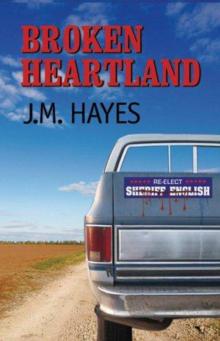 Broken Heartland
Broken Heartland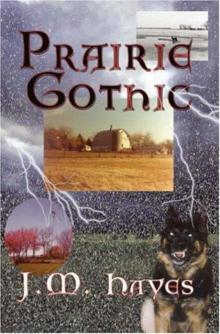 Prairie Gothic
Prairie Gothic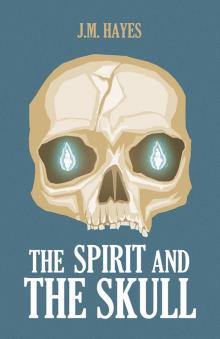 Spirit and the Skull
Spirit and the Skull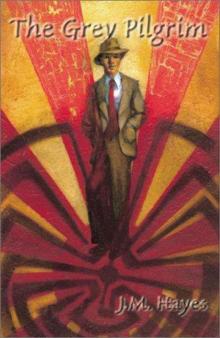 The Grey Pilgrim
The Grey Pilgrim Plains Crazy
Plains Crazy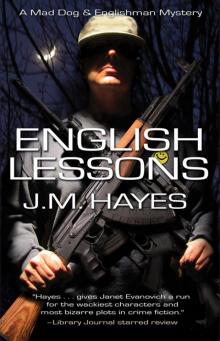 English Lessons
English Lessons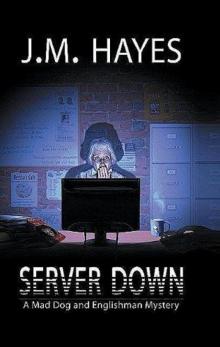 Server Down
Server Down